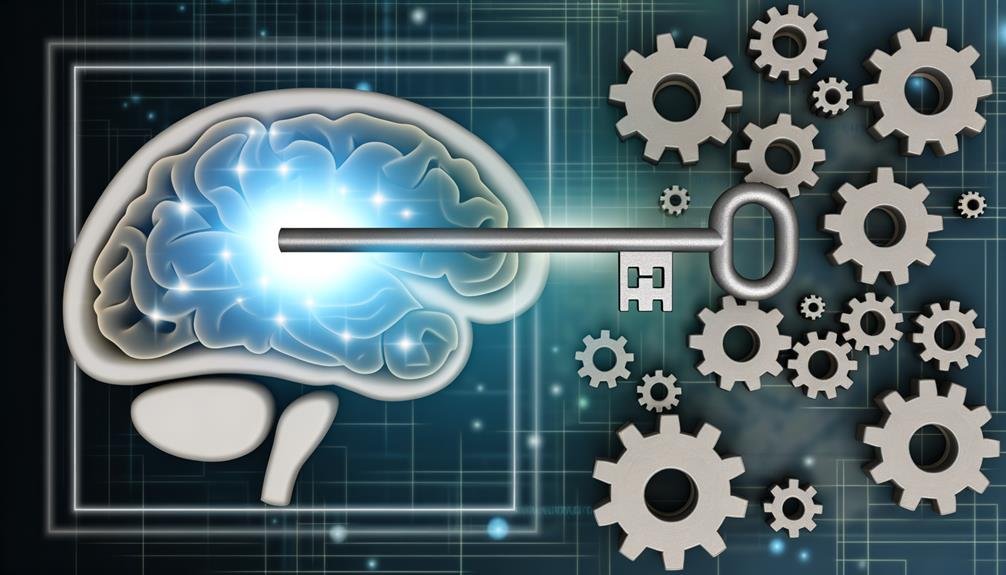Unlocking the Secrets of Learning Mindsets
What if the key to unlocking our full potential lies within our mindset? Understanding how our beliefs about learning shape our abilities is just the tip of the iceberg.
As we probe deeper into the intricacies of learning mindsets, we unravel a tapestry of strategies that could revolutionize the way we approach education and personal development.
Join us on this enlightening journey as we uncover the secrets that could transform how we perceive and engage with the learning process.
Key Takeaways
- Learning mindsets impact memory retention and application.
- Effort and attention are essential for developing effective learning habits.
- Recent events are easier to remember and integrate into knowledge.
- Emotions play a significant role in shaping memory and learning outcomes.
Importance of Learning Mindsets
Why are learning mindsets crucial for effective knowledge retention and skill development?
Mindset transformation plays a pivotal role in shaping how we approach learning tasks and challenges. Research indicates that individuals with a growth mindset, believing in the ability to develop skills through dedication and hard work, are more likely to persevere when faced with obstacles. This positive attitude fosters a learning motivation that fuels continuous improvement and mastery.
In contrast, individuals with a fixed mindset, believing abilities are innate and unchangeable, may shy away from challenges to avoid failure. By cultivating a growth mindset, one can enhance learning outcomes, boost self-confidence, and embrace challenges as opportunities for growth and development.
Factors Influencing Learning Mindsets
Factors influencing learning mindsets encompass a range of cognitive, environmental, and motivational elements that shape individuals' approaches to acquiring knowledge and skills. When considering what influences learning mindsets, it's crucial to delve into various factors such as:
- Motivational factors: Understanding what drives individuals to learn can significantly impact their mindset towards acquiring knowledge.
- Cognitive processes: How individuals process information, reason, and problem-solve plays a fundamental role in shaping their learning mindset.
- Environmental influences: The surroundings, resources, and support available can either hinder or enhance an individual's mindset towards learning.
- Neuroplasticity: The brain's ability to reorganize itself by forming new neural connections in response to learning experiences can influence learning mindsets.
- Social interactions: Interacting with peers, mentors, and educators can also impact how individuals perceive learning and their mindset towards it.
Strategies for Cultivating Positive Mindsets
To foster positive mindsets conducive to effective learning, it's imperative to implement strategic approaches that capitalize on motivational, cognitive, environmental, neuroplastic, and social factors influencing individuals' learning orientations.
Cultivating a growth mindset is essential, encouraging individuals to embrace challenges, persist in the face of setbacks, and see effort as a path to mastery. Positive psychology plays a crucial role in shaping mindsets by focusing on strengths, optimism, and resilience.
Providing a supportive and encouraging learning environment, fostering a sense of belonging and competence, and promoting neuroplasticity through engaging activities can further enhance positive mindsets.
Impact of Mindsets on Learning Outcomes
Research indicates a strong correlation between individuals' mindsets and the outcomes they achieve in the learning process. When exploring the impact of mindsets on learning outcomes, it becomes evident that:
- Mindset impact: Different mindsets can significantly influence student motivation and engagement.
- Cognitive development: Mindset research shows that beliefs about intelligence can shape cognitive development.
- Self-fulfilling prophecies: Mindsets can act as self-fulfilling prophecies, affecting how students approach challenges.
- Growth vs. fixed mindsets: The belief in the ability to improve (growth mindset) versus the notion that abilities are fixed (fixed mindset) can shape learning outcomes.
- Resilience and perseverance: Mindsets can impact students' resilience and perseverance in the face of academic setbacks.
Overcoming Barriers to Growth Mindsets
Overcoming barriers to embracing growth mindsets requires a strategic approach that addresses individual beliefs and learning environments. Mindset transformation and self-improvement strategies play a crucial role in fostering a growth mindset.
Individuals can cultivate this mindset through resilience-building techniques that encourage them to view challenges as opportunities for growth. Research suggests that embracing setbacks as learning experiences and focusing on effort rather than innate abilities can help individuals develop a growth mindset.
By incorporating resilience-building techniques such as reframing failures as learning experiences and seeking constructive feedback, individuals can overcome obstacles to growth mindsets.
Creating a supportive learning environment that promotes effort, perseverance, and continuous improvement is essential for nurturing a growth mindset in both personal and educational settings.
Role of Feedback in Shaping Mindsets
Feedback plays a pivotal role in shaping mindsets by providing valuable insights and guidance for personal and professional development. Understanding feedback dynamics can lead to mindset transformation. Here are key points to consider:
- Feedback should be specific and constructive.
- Timely feedback allows for immediate course correction.
- Encouraging a growth mindset through feedback fosters resilience.
- Feedback should focus on effort and progress rather than innate abilities.
- Constructive feedback promotes a culture of continuous improvement.
Applying Growth Mindsets in Education
Applying growth mindsets in education enhances students' adaptability and resilience in the face of challenges, fostering a deeper understanding and mastery of academic concepts. Mindset transformation is crucial for student motivation, leading to improved educational success. Research shows that students with a growth mindset believe in their ability to develop intelligence and skills through effort and perseverance. This belief empowers them to embrace challenges, learn from criticism, and persist in the face of setbacks. By instilling a growth mindset in educational settings, students are more likely to exhibit higher levels of engagement, academic performance, and overall well-being. Cultivating this mindset can revolutionize learning outcomes and equip students with the mindset needed to navigate the complexities of the modern world.
| Benefits of Growth Mindset in Education | ||
|---|---|---|
| Increased adaptability and resilience | Enhanced student motivation | Improved academic success |
Leveraging Mindsets for Personal Development
Leveraging different mindsets can significantly impact personal development by shaping one's approach to challenges and opportunities. When it comes to mindset transformation, individuals can employ various self-improvement strategies to foster growth.
Mindset development opens doors to personal growth opportunities that would otherwise remain untapped. By consciously working on our mindsets, we can unlock our full potential and achieve remarkable progress in different areas of our lives.
Embracing a growth mindset allows for continuous learning and adaptation, leading to enhanced personal development. Through intentional mindset shifts and the implementation of effective self-improvement strategies, individuals can pave the way for significant growth and fulfillment in their personal journeys.
Conclusion
In conclusion, unlocking the secrets of learning mindsets is like embarking on a thrilling treasure hunt, where each discovery leads to a deeper understanding of our cognitive potential.
Just as a compass guides us through uncharted territories, cultivating a growth mindset empowers us to navigate challenges with resilience and curiosity.
Let's continue to explore the vast landscape of learning, armed with the knowledge that our mindsets shape the trajectory of our educational and personal growth.







